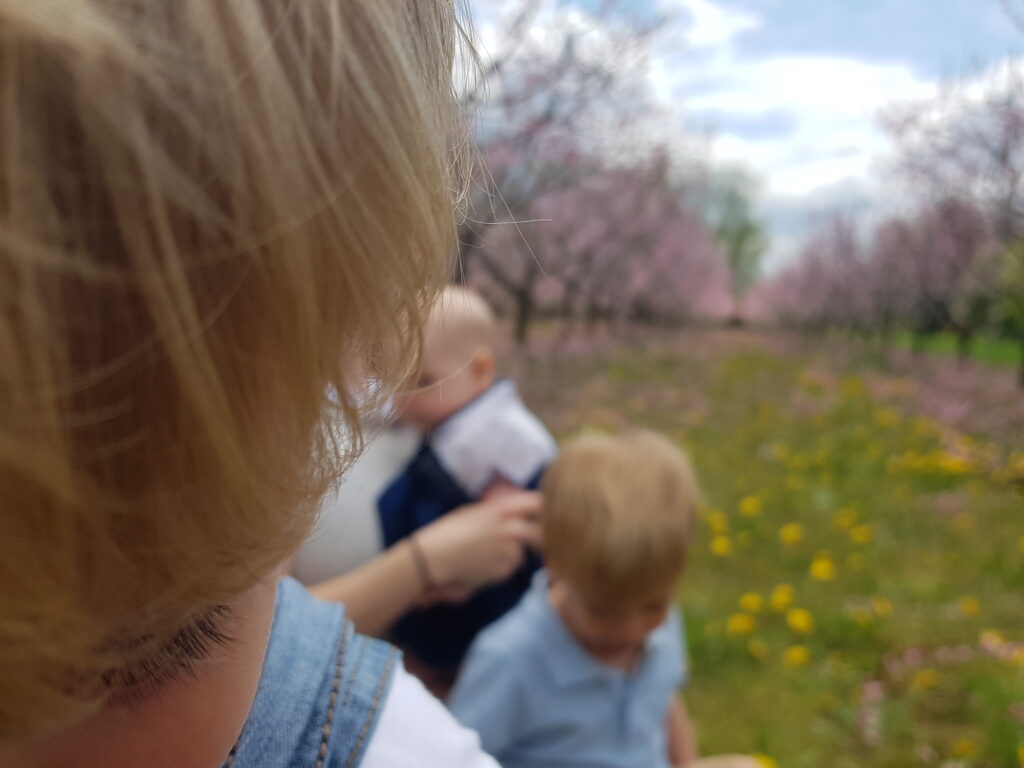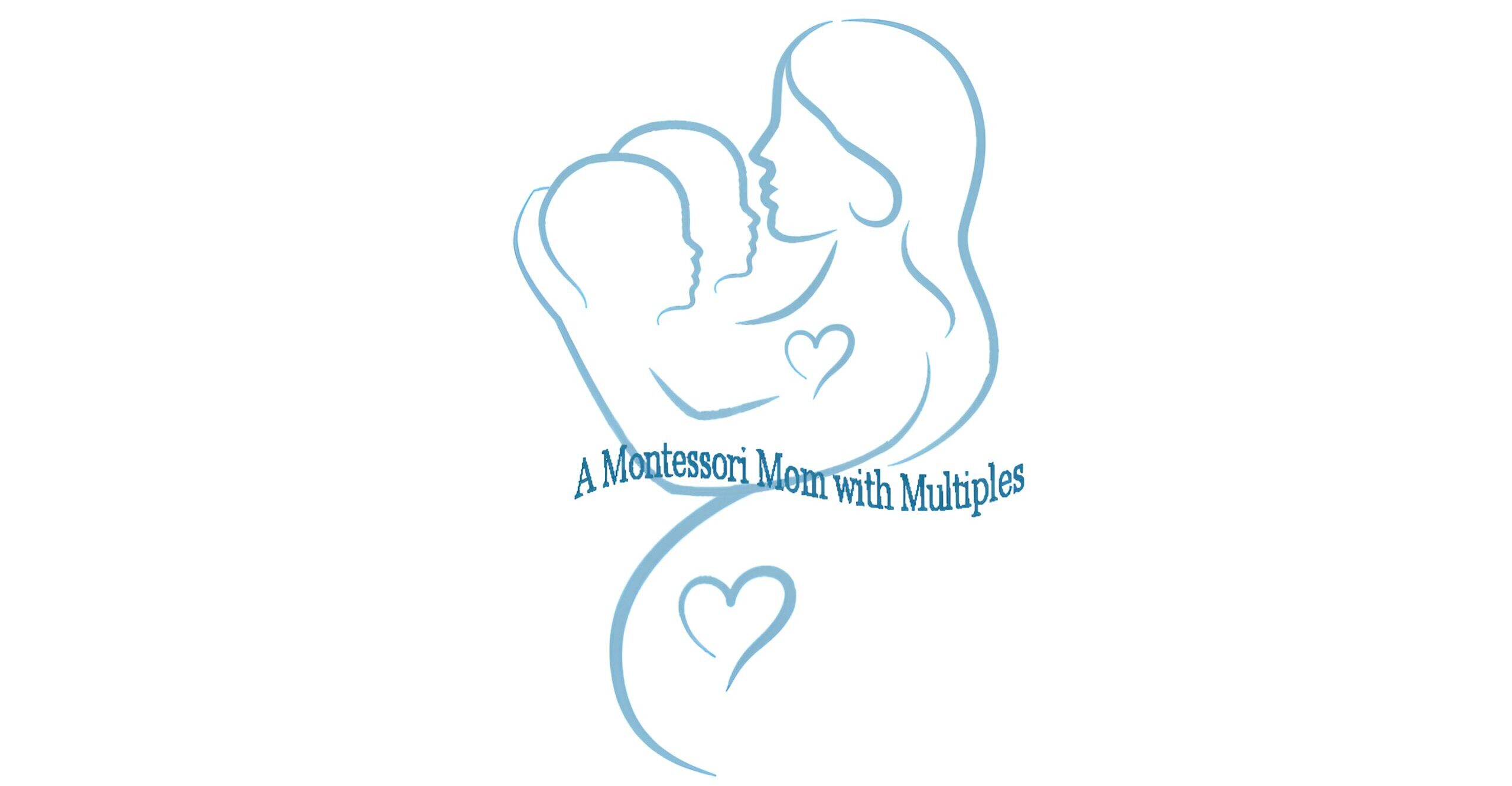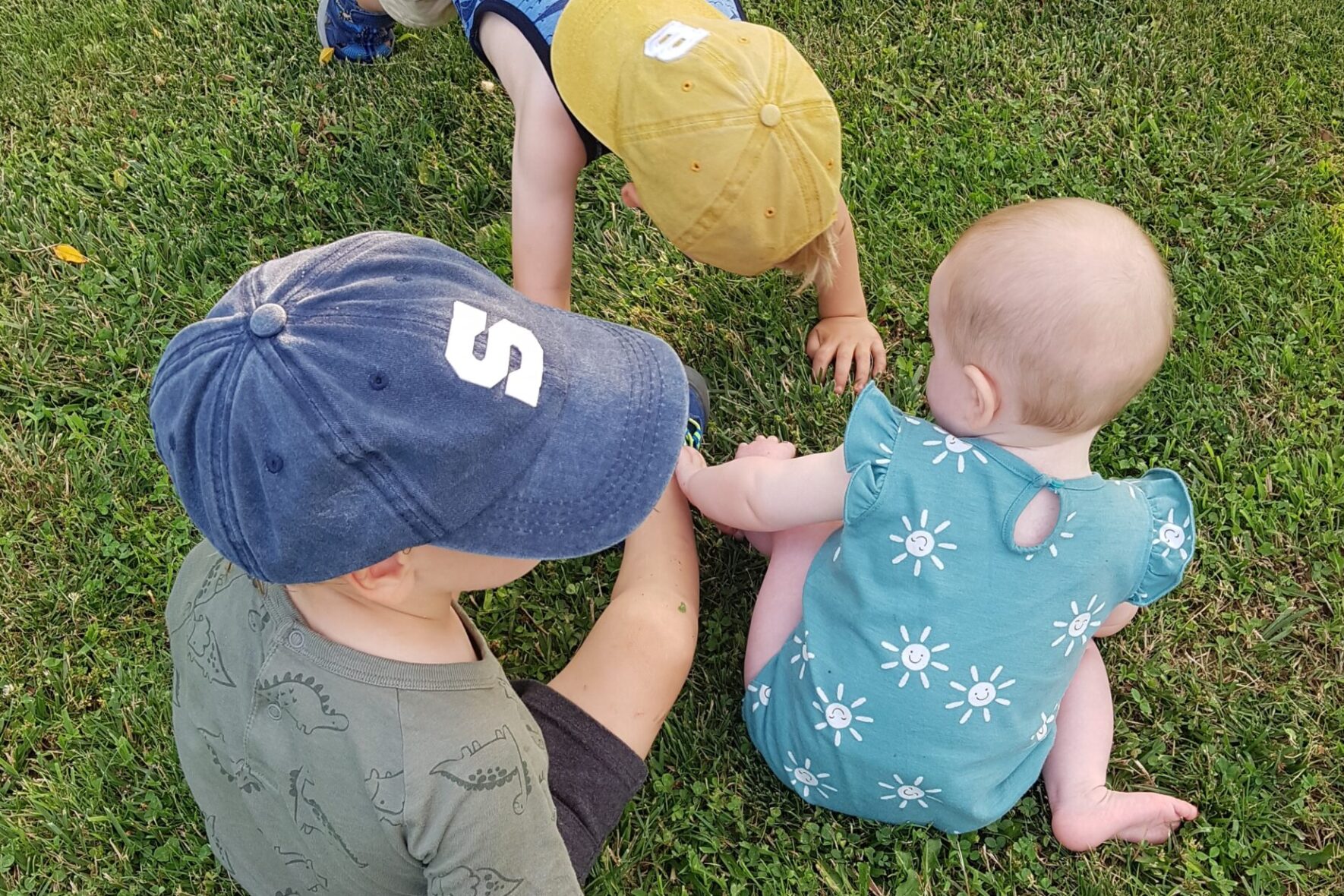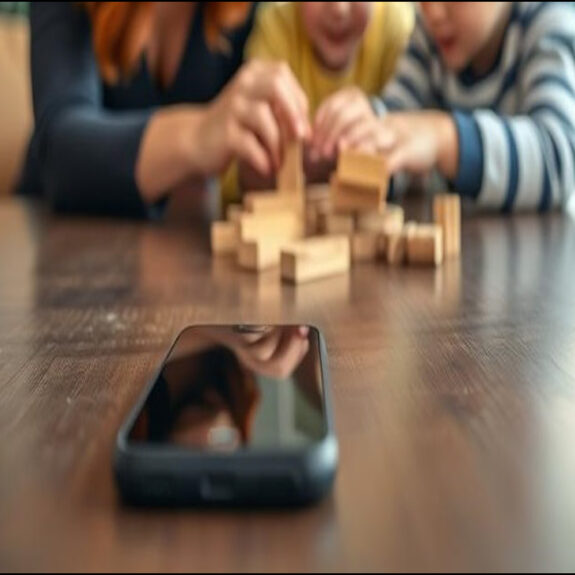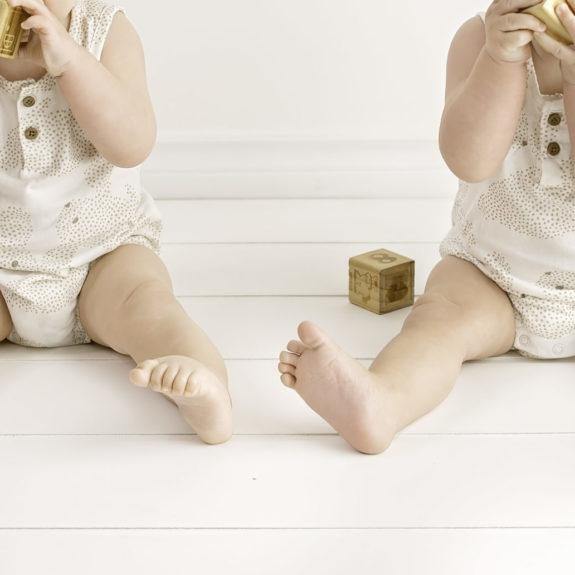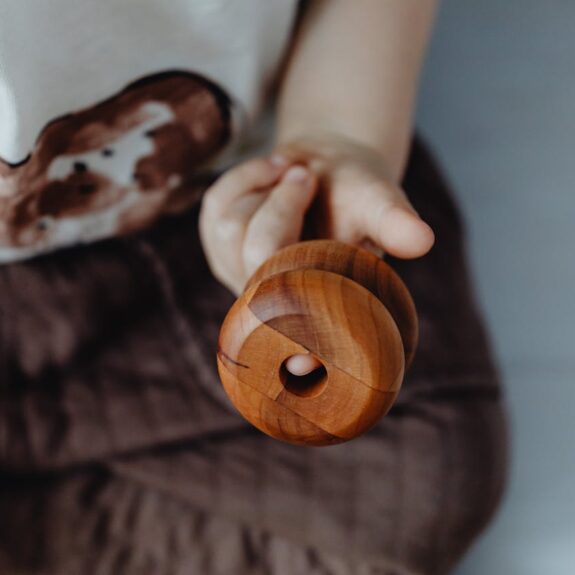Parenting 3 children under the age of 2 may sound like inviting chaos, (and it is) but it’s also full of unexpected joy. A test of one’s deep personal growth. This blog post isn’t meant as a catch all guidebook applicable to every child, parent or family. Rather, it’s one mother’s reflection on what this season of life has taught me. A soft dive into motherhood, shifting identity, and the challenges we are tested by while raising 3 under 2 years old.
Why I Had 3 Children Under 2 Years Old.
My goal in life was always to be a mother. In the just over 2 ½ years I gave birth to four children. My journey began with the heartbreaking loss of my first daughter, who was born sleeping. Then my unexpected birth of twin boys, followed by another baby girl.
My twin boys & baby girl are just 21 months apart
Why So Close in Age?
The decision to have so many children so close in age is a complex one. My pregnancy loss certainly set the tone that nothing in life is guaranteed. Already in my early 30s with my twins, that window to have more children would be narrowing. I didn’t want to pause my fertility journey with any expectation that another baby would still be a possibility further down the road if I decided to wait.
Beyond the emotional and biological reasons, there were practical reasons too. Having children close in age came with its own set of benefits:
- No need to store baby gear for years or repurchase everything later
- Bulk buying diapers, wipes, and even prenatals is so much more economical
- Siblings could pass down car seats, clothes, and toys with minimal wait in between
- A crunch-time window of diapers, breastfeeding, and late night feeds
Going from 2 to 3: Having A Baby After Twins
When you have twins, people often assume that’s it. “One (pregnancy) and done” was a phrase strangers loved to shout at us while ogling my twins from across the aisle.
It also seems to be far more common with twin families that the twins are the youngest or only children. Few endeavor to roll the dice on another child after twins, especially knowing there’s a chance of having another set. I seem to be an anomaly. Statistically, I had about a 1 in 12 chance of having twins again. I wanted to take that chance. I was happy to have another child, or two, if that was the outcome.
For me, the gift of another child was everything I had hoped for. I will forever advocate that, from my experience, raising a newborn singleton with twin toddlers is 1000% easier than raising just newborn twins. No competition. Twins is one of the greatest gifts I never had dreamed I would be blessed with- but the first year was a struggle.
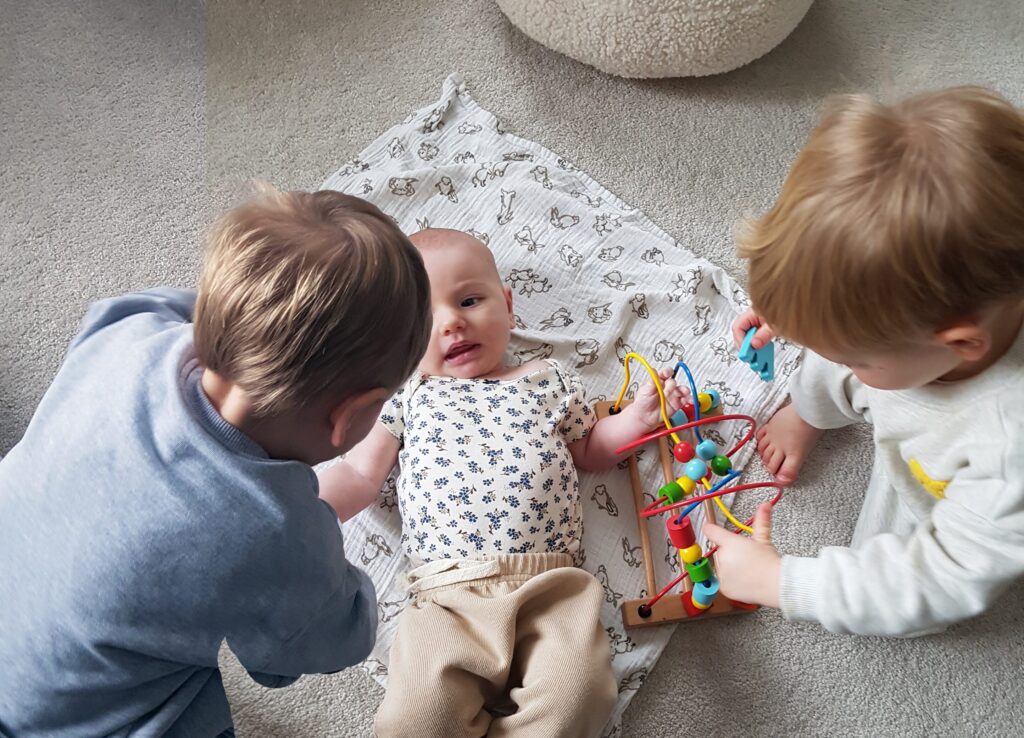
The Mental Load: Mom Brain and Identity Shifts
Postpartum Depression: I experienced postpartum depression after the birth of my twins. Grief, hormones, and sleep deprivation, all while caring for two tiny babies, was a bittersweet experience. Having been familiar with the experience, I was better prepared to anticipate and navigate potential postpartum depression in my third pregnancy. Thankfully, I did not have any here.
Overstimulated & Over-Touched:Anyone raising three children under 2 years old is going to be mourning their body’s autonomy. My children are wonderful at playing independently, but between breastfeeding, reading stories on the couch, nursing ‘bonks’ with hugs, and all that lifting and carrying in between, I am fried by the day’s end. It’s not just being overtouched—it’s all the other sensory input. Each child asking for or indirectly requiring my attention. Sometimes just sitting and observing three curious little ones is tiring.
The Physical Toll: Caring for You When You’re The Caregiver
Parenting babies while Pregnant: This last pregnancy took the biggest toll on me. Not only were all my pregnancies stacked back-to-back, leaving my body little time to recover, but this time I was also juggling a physically demanding job and caring for two toddlers while pregnant. I had to balance being physically present for hyperactive little ones who still expected to be lifted, carried, and chased around at the park. I was often running at max exhaustion. On the plus side, I did pass out quickly when my head hits the pillow.
Staying Active: With my previous pregnancies, I had been able to work out both during and shortly after giving birth, which helped with my physical and mental recovery. I was still running up to 5km several times a week late into the second trimester, and weightlifting up until birth. But after my third pregnancy, things were different. My mobility was limited, and my body didn’t bounce back the way it had before. I am the athletic sort, who enjoys keeping fit to feel accomplished. While I was still plenty mobile- there’s just no sitting on your ass with 3 under 2 years- that kind of physical activity will never be as satisfying. I had to give myself more time and grace to let my body heal, and my family’s rhythm to settle, before returning to my workouts again. Since I’m still breastfeeding, I simply don’t have the same time allowance or bandwidth for those high intensity hour long workouts or 10km runs. I’ve had to dial it back—for now—and find ways to enjoy being physically active that work with what I have to offer.
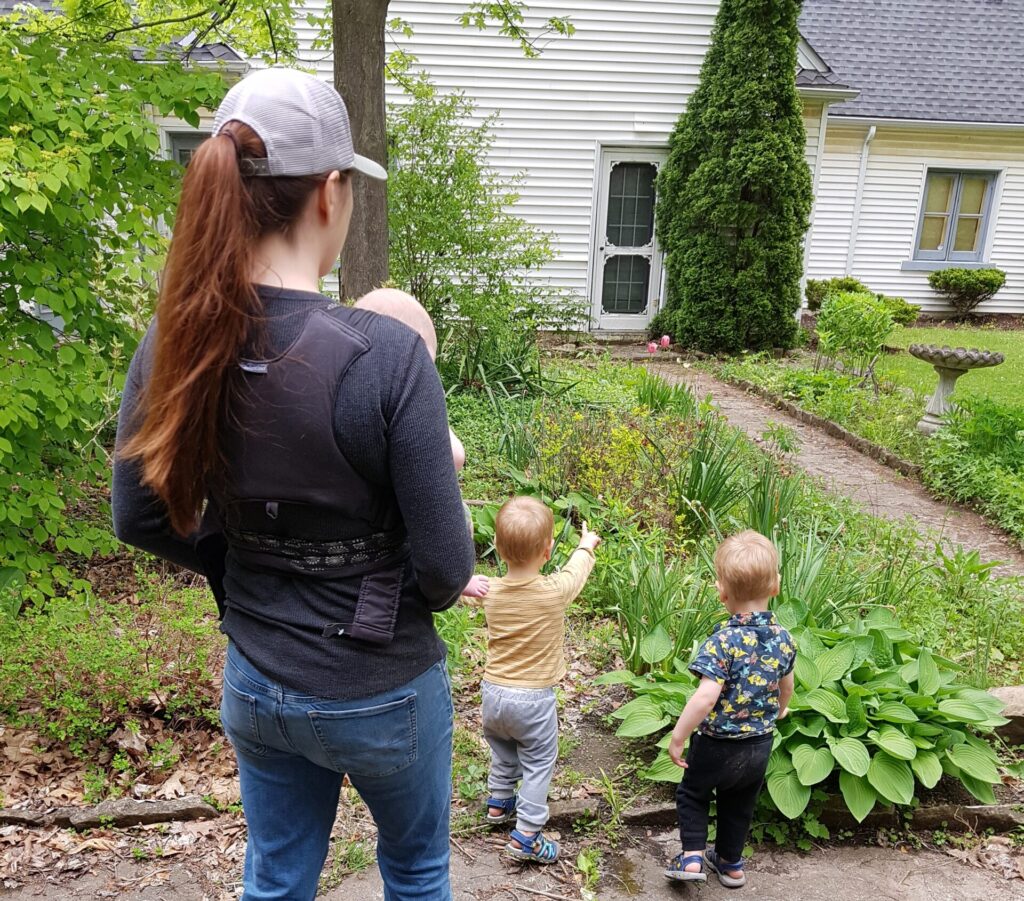
Strategies for Surviving 3 under 2 years
1. Declutter The House
Your life before children will be so different than your life after. Especially after baby number two, and then baby number three.
So much of my pre-kids energy outside of work was turned inwards: elaborate beauty routines (skin, makeup, hair), extensive workouts, long days out shopping, weekend out partying and too much time dedicated to fussing over the state of my home. I would go all out decorating for every holiday and season. All of that to say, I had a lot of stuff and much more free time and space to manage it.
That all went out the window between child two and three.
Everything had to be made baby-proof. There was no longer enough upward space to keep things out of reach. Many things I owned were no longer appropriate for this season of life. Some may be again in the future, and others I was certain no longer aligned with my priorities. Before baby #3 arrived, I took a hard, honest look at everything. Room by room, I decluttered. Nothing was safe.
The likelihood of having 12 over for coffee? Near impossible. Kitchen drawers and cabinets were ruthlessly cleared out. Countertop items were scaled back in preparation for four curious little hands always reaching for something. I was already outnumbered, and now I would be playing defense with one less hand in play holding a new born. I applied that same critical eye to every space: the bathroom, the bedrooms, the living areas. The goal was a safe environment my children could move room to room independently. Freedom within limits. Little ones #1 and #2 could dress, toilet, play and tidy up with as little adult interference as possible while I tended to baby #3. This meant streamlining spaces to remove hazards and temptations.
Decluttering wasn’t just about making space in our home. It was about shifting our mindset to meet our current reality. Letting go of possessions that no longer serve us, and releasing the expectations of what life used to be. The home needed to work for all of us. A space that still speaks to our tastes adults without being a total baby takeover.
2. Shift Your Expectations — Don’t Lower Them
I often see overwhelmed moms being told to lower their expectations—of themselves, their homes, their routines. This never sat right with me. Lowering one’s expectation always felt like a declaration of surrender, and on bad days, failure. On very hard days, that mindset feels more like defeat than a source of relief.
Instead, I prefer to position it as shifting expectations, rather than lowering them.
When you lower expectation, you are still clinging to the expectations of your past. Your life is very different now, and that difference should be acknowledged. When you shift your expectations, you’re honoring how you life has changed and choosing to face a new reality with intention. That means stepping back and reassessing what life truly looks like in this season— because your reality has completely changed. Does that sound like just semantics? I don’t think so. It’s a complete shift in your mentality from a position of defeat to one of intention. And in this season where there will be times that it feels like you are hopelessly drowning, that sense of clarity is your life raft. It’s not about expecting less, but rather embracing that life is different now and requires an entirely different approach.
Here’s what that looks like in real life:
- The house doesn’t have to be pristine, but it does need to be safe. That means, like it or not, toys need to be cleared from the floor to prevent tripping hazards, dishes have to be done promptly (lest my tall and clever toddlers reach in and pull them out), and the floor gets vacuumed frequently to prevent pests. It’s not glamorous, but for us it’s critical keep our home functional.
- “Me time” is not a write off, but it is condensed. If I only have 30 minutes of decompression time before bed, how am I going to spend it? Aimless online scrolling is likely to leave me unfulfilled and up later than intended. Right now I might not even have time to complete an episode of TV. Instead, my priority shifts to eating a good meal, some light reading and perhaps a night-time skin routine.
- I have a active to-do list on my kitchen white board. Extraordinary projects like painting anything where paint is chipping, or transferring and organizing the thousands of kids photos off my phone. I may not cross off everything on my to-do list, but I can celebrate what I did get done.
3. Work On Your Communication Skills
One of the simplest ways to prepare for baby #3 is by helping your toddlers become familiar with the names and locations of everyday items around the home. Think a place for everything, and everything in its place. Start this process before the baby arrives by consistently naming the objects you touch and use. Narrate the process and get them involved to build muscle memory into the routine.
Be patient—this will take a lot of repetition. But it’s worth it. Not only are you laying the foundation for strong language skills, you’re also supporting your child’s natural need for order and routine. Meltdowns typically appear in the face of confusion. Routine and order bring reassurance.
With a baby in your arms most of the day, you won’t be able to rely on being physically able to get up or bend down for every little task. Your voice becomes your main parenting tool. Practice giving clear, calm directions like, “Please hand mama the blanket” or “Let’s put the toys away onto the shelf.” It might sound simple, but it can be surprisingly tricky when your gestures are limited and postpartum fog sets in.
Narrating your actions not only helps your children understand the rhythm of the day but also keeps them feeling involved rather than sidelined. It warms my heart to see how much my twins love being part of caring for the baby—and how much better they handle their emotions when they clearly understand what’s expected.
Lastly, I often hear moms giving directions in the form of questions and then feeling frustrated when “Can you please ___?” is met with a firm “No.” This is frustrating for mom, but also confusing for the child when their choice is not respected because mom isn’t understanding that a choice is being given. Only provide choice where all answers are acceptable. Instead of “Can we go to bed please?” remind them it is time for bed, but offer a choice of that is within boundaries, such as which pajamas they would like to wear or which bedtime story to read.
4. Cherish the Season
I have a sweet photo of just my boys. They had climbed into my lap, one with a huge smile, reaching out to touch my face, while the other cuddled sweetly into my side. A perfectly tender moment that wouldn’t look out of place framed on the mantel. But in truth, that photo was taken just moments before a full-blown meltdown. It’s funny how often our most beautiful memories are born out of chaos. How easy it is to look back with rose-colored glasses.
I won’t sugarcoat it, raising three children under the age of two is intense. Physically exhausting, emotionally draining, and even when everything is running smoothly there is an understanding that peace is fleeting. Some days feel like little more than survival mode. I’ve had very promising days filled with excitement and joy that crumble before breakfast, and then it feels like auto pilot until nap. It’s not a romantic life, and it’s okay to admit it.
Hidden inside all the exhaustion and self-doubt is an immense gratitude that I was gifted with these three little lives. As much as I am struggling to figure it all out, so are they. These tender months and years are so short. Even on days when the minutes tick by like hours.
